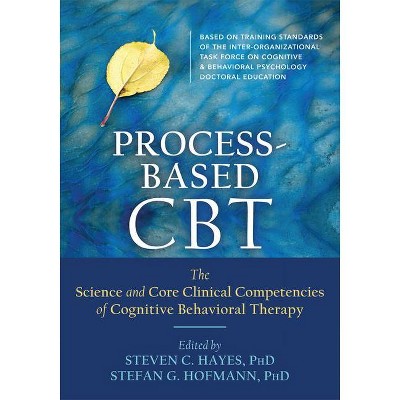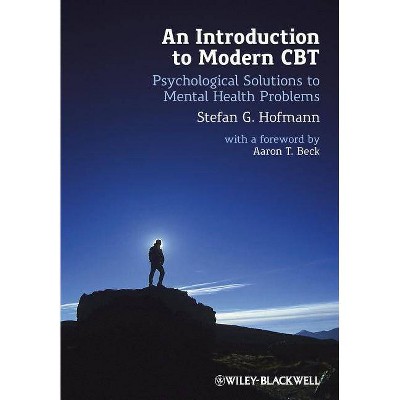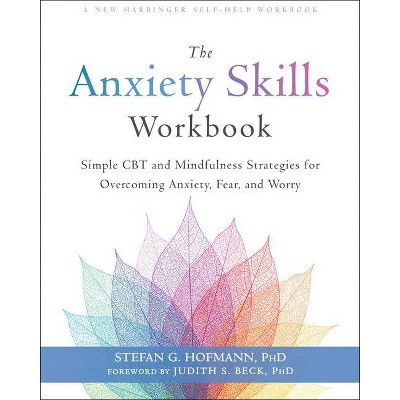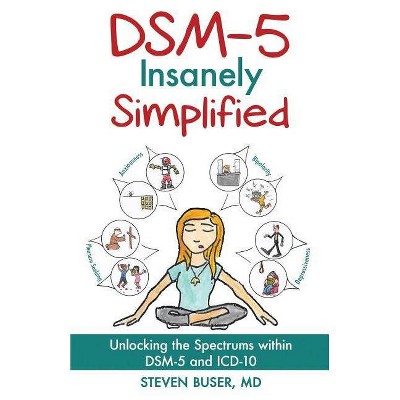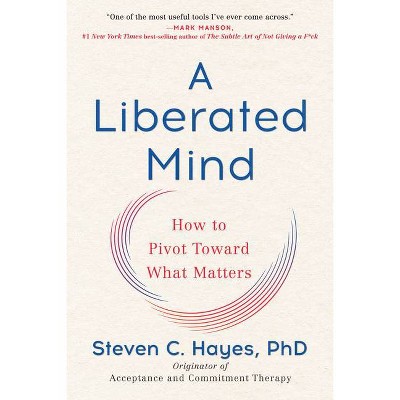Beyond the Dsm - by Steven C Hayes & Stefan G Hofmann (Paperback)
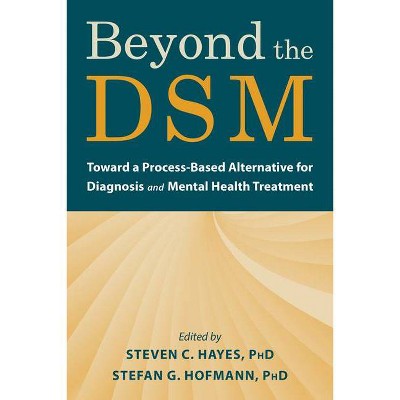
Similar Products
Products of same category from the store
AllProduct info
<p/><br></br><p><b> About the Book </b></p></br></br>In this groundbreaking volume, two renowned experts in the field of psychology examine the ongoing efforts to move beyond the DSM diagnosis model to create a new, flexible treatment protocol--one that is tailored to clients' individual needs. With this book, clinicians and researchers will come away with a thorough understanding of process-based treatment, and how it can be implemented to improve human suffering and increase well-being.<p/><br></br><p><b> Book Synopsis </b></p></br></br><p>As a mental health clinician, you know that every client is unique, and a client's symptoms are the result of a complex combination of psychological, environmental, genetic, and neural factors. However, the de facto DSM model poses considerable constraints on how you can treat clients--often resulting in a one-size-fits-all diagnosis. This important volume challenges the assumptions and approach made by the DSM, and provides a vision and plan for an evidence-based, process-based approach to individualized care.</p><p>With contributions from renowned experts in the field--including Steven C. Hayes, Stefan G. Hofmann, Joseph Ciarrochi, Matthew McKay, Uma Vaidyanathan, Sarah Morris, David Sommers, J. Scott Fraser, and many more--this groundbreaking book will show you a new way to recognize the complexity of human suffering and human prosperity. You'll find solid tips for treating a wide variety of psychological issues in a more flexible way. And, finally, you'll come away with a greater understanding of the "processes of change," and how to build a solid foundation for an alternative to syndromal diagnosis.</p><p>The future of mental health treatment is process-based. Whether you're a clinician, researcher, student, instructor, or other professional working in the mental health field, this breakthrough volume offers everything you need to understand process-based treatment and create a more customized and effective approach to treating clients.</p><p/><br></br><p><b> Review Quotes </b></p></br></br><br>"A broad and deep consensus exists, even among the framers of DSM criteria, that alternative paradigms for diagnosis and treatment of psychological disorders must be developed if the field is to advance. But just what approach will be best? In this forward-looking volume, Hayes and Hofmann assemble the most sophisticated treatment models--all of which emphasize process, dimensionality, a functional analysis of behavior, and the ability to individualize and personalize diagnosis. Every mental health professional will benefit from these developments." <br><b>--David H. Barlow, PhD, ABPP</b>, professor of psychology and psychiatry emeritus, and founder of the Center for Anxiety and Related Disorders (CARD) at Boston University--David H. Barlow, PhD, ABPP<br><br>"I LOVE this book. A surefire way to get a headache is to try to provide evidence-based care using empirically supported treatments for DSM syndromes while also attending to the evidence-based processes described in the basic science literature that appear to account for the struggles of the individual I'm caring for right now. This book addresses that dilemma, offering creative ideas for a unified science of psychopathology, its classification, and its treatment." <br><b>--Jacqueline B. Persons, PhD</b>, director of the Oakland Cognitive Behavior Therapy Center; clinical professor in the department of psychology at the University of California, Berkeley; and author of <i>The Case Formulation Approach to Cognitive-Behavior Therapy</i>--Jacqueline B. Persons, PhD<br><br>"One would certainly expect Hayes and Hofmann to provide a thoughtful and integrative compendium on process-based approaches to assessing, diagnosing, and treating psychological problems. In this edited volume, they assemble cutting-edge thought leaders to effectively deliver on this expectation. Chapters provide a depth and breadth of focus that is detailed yet easy to consume, laying a solid foundation from which researchers and practitioners of various theoretical orientations can better understand and help shape a process-based future for psychotherapy." <br><b>--Gordon J. G. Asmundson, PhD</b>, professor of psychology at the University of Regina, development editor for <i>Clinical Psychology Review</i>, and editor in chief of <i>Journal of Anxiety Disorders</i>--Gordon J. G. Asmundson, PhD<br><br>"Syndromal diagnosis provides a starting point for the classification of mental health disorders, but one that is inherently limited in terms of tracking underlying etiological pathways and principles of change. This volume describes a process-based approach that provides a far more compelling basis for organizing the causal processes underlying the etiology of mental health problems, be they diseases or disorders or the adaptations themselves that evolved to enhance reproductive fitness." <br><b>--Steven D. Hollon, PhD</b>, Gertrude Conaway Vanderbilt professor of psychology at Vanderbilt University with a long-standing interest in the treatment and prevention of depression--Steven D. Hollon, PhD<br><br>"The DSM-based approach is unlikely to create a better understanding of, or more effective treatments for, mental health problems. Hayes and Hofmann offer a path forward. Open to various therapeutic traditions, based in science, and sensitive to client individuality, this book lays out multiple exemplars of understanding and treating mental health concerns based on the processes that create and maintain the problems--rather than the categories that describe them. This is a thought-provoking book that should be on the shelves of all clinicians and clinical researchers." <br><b>--Douglas W. Woods, PhD</b>, dean of the Graduate School, and professor of psychology at Marquette University--Douglas W. Woods, PhD<br><br>"This impressive volume is a genuine advance in our efforts to understand psychological dysfunction. Hayes, Hofmann, and their contributing authors present exciting alternatives to traditional categorical diagnosis à la DSM and ICD--drawing from research that spans neuroscience, learning, coping, and culture. These new ideas can enrich the search for mechanisms that underlie psychopathology, guiding identification of treatment targets and the construction of principle-guided, individually tailored interventions<i>.</i>" <br><b>--John R. Weisz, PhD, ABPP</b>, is professor of psychology at Harvard University, and director of the Harvard Lab for Youth Mental Health, specializing in developing and testing transdiagnostic interventions for young people--John R. Weisz, PhD, ABPP<br><p/><br></br><p><b> About the Author </b></p></br></br><p>Editor <b>Steven C. Hayes, PhD</b>, is Nevada Foundation Professor in the department of psychology at the University of Nevada, Reno. He has been president of numerous professional organizations, is author of forty-five books and nearly 650 scientific articles, and is among the most cited living psychologists. He has shown in his research how language and thought leads to human suffering, and is originator and codeveloper of acceptance and commitment therapy (ACT): a powerful therapy method that is useful in a wide variety of areas; relational frame theory (RFT): an empirical program in language and cognition; and process-based therapy (with Stefan G. Hofmann). <p/> Editor <b>Stefan G. Hofmann, PhD</b>, is professor of psychology in the department of psychological and brain sciences at Boston University. He has been president of numerous professional organizations, and is currently editor in chief of <i>Cognitive Therapy and Research</i>. He has published more than 400 peer-reviewed journal articles and twenty books. He is a highly cited researcher, and has received many awards, including the Humboldt Research Award. His research focuses on the mechanism of treatment change, translating discoveries from neuroscience into clinical applications, emotion regulation, and cultural expressions of psychopathology. He is codeveloper (with Steven C. Hayes) of process-based therapy.</p>
Price History
Cheapest price in the interval: 41.99 on November 8, 2021
Most expensive price in the interval: 41.99 on December 20, 2021
Price Archive shows prices from various stores, lets you see history and find the cheapest. There is no actual sale on the website. For all support, inquiry and suggestion messagescommunication@pricearchive.us
